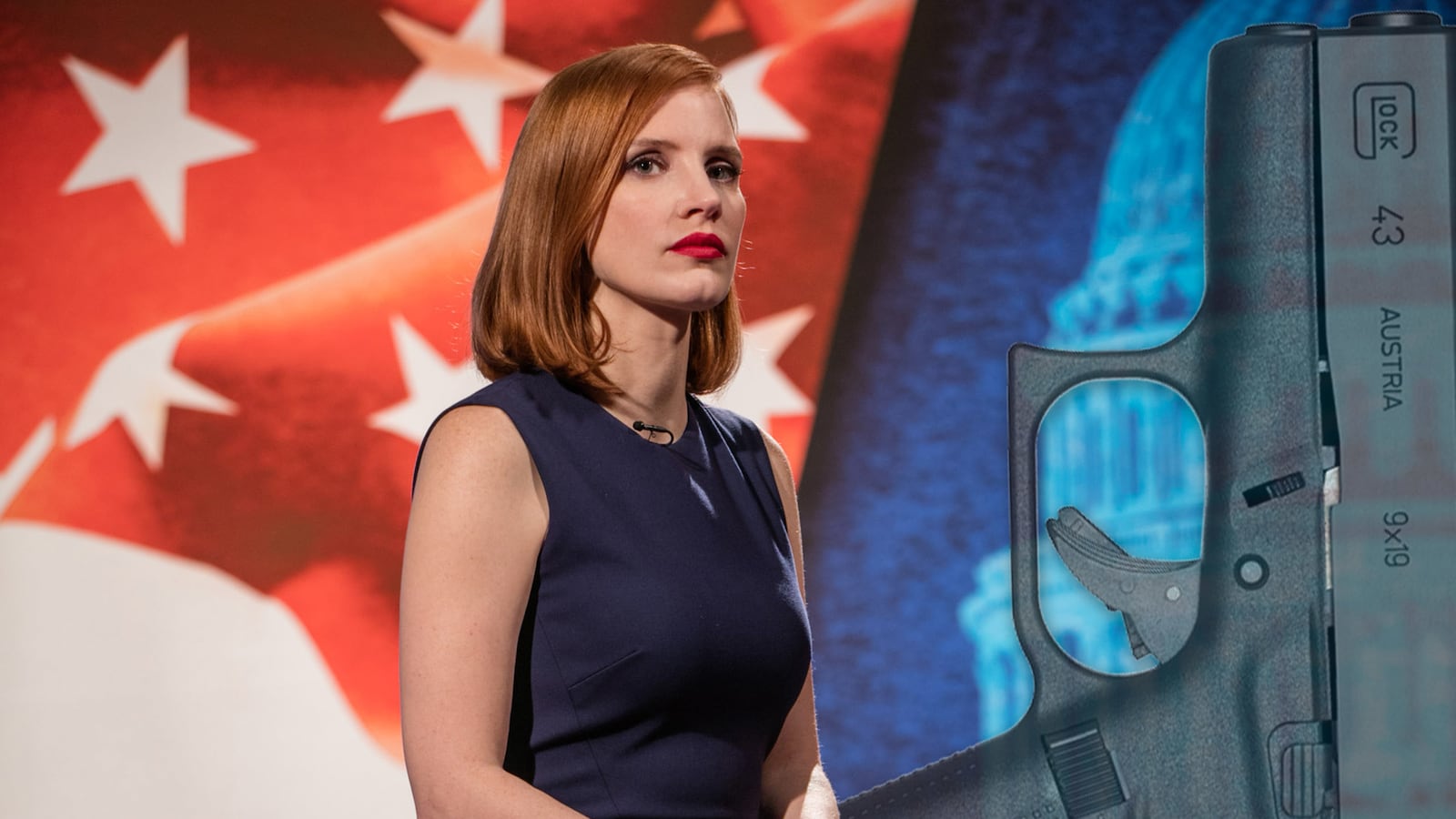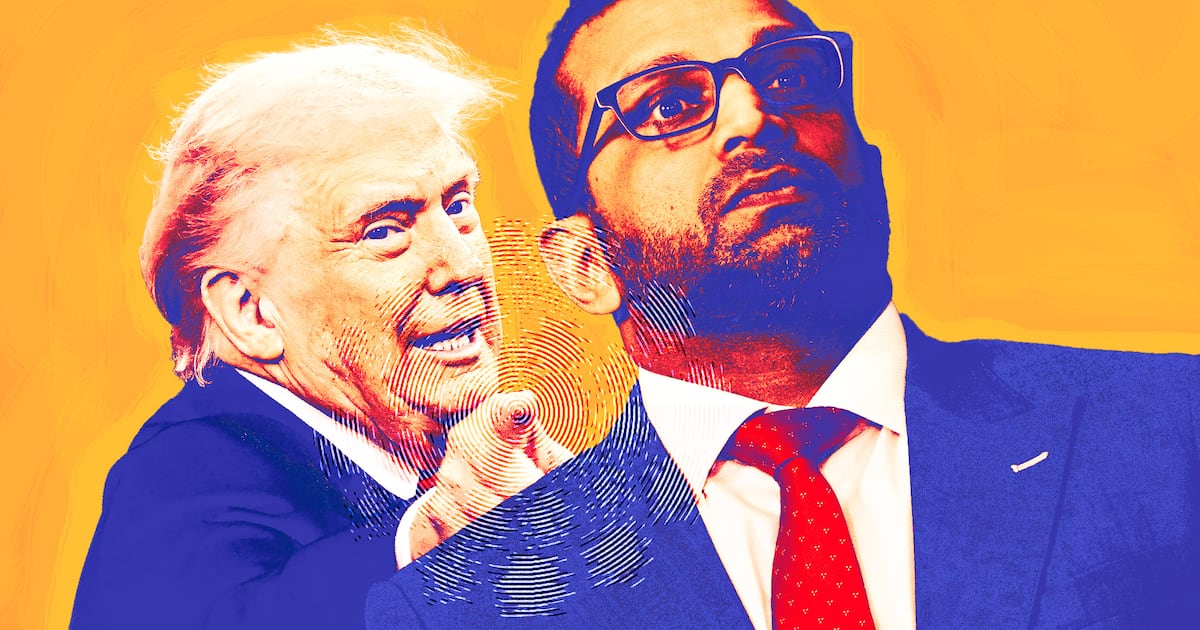A few years ago, the British-born Jonathan Perera was teaching elementary school in South Korea when, on a lark, he started writing the screenplay that would become this month’s political thriller Miss Sloane, starring two-time Oscar nominee Jessica Chastain.
Perera says he might have abandoned a first draft of the script, which focuses on a battle-hardened female lobbyist who gives herself the Herculean challenge of taking on the gun lobby, had he not stumbled across an article in Variety that outlined Harvey Weinstein’s plans to make a film starring Meryl Streep that he said would make the NRA “wish they weren’t alive after I’m done with them.”
“I didn’t actually have any confidence that anyone in Hollywood would have any interest in it,” Perera tells The Daily Beast of his script. But after reading the article, he thought, “If the Weinstein Company thinks that the American people are going to be interested in this movie, then perhaps I should try to get mine out.
“It was ultimately that that gave me the impetus to start soliciting and cold-querying representatives in L.A.,” he adds. “And it all kind of came together from there.”
Nearly three years later, Miss Sloane is opening in theaters and the Weinstein Company’s gun control movie has yet to materialize.
Around the same time he teased his anti-NRA film—working title, The Senator’s Wife—Weinstein announced his intentions to scale back the gun violence in the films his company puts out. “I have to just choose movies that aren’t violent or as violent as they used to be,” he told Piers Morgan on CNN in January 2014. “And I know for me, personally, I can’t continue to do that. The change starts here. It has already.”
In December 2015, Weinstein produced Quentin Tarantino’s The Hateful Eight, which contained a large amount of gun violence, though whether it could be a considered “gratuitous” is up for interpretation.
“It’s brave of Harvey Weinstein to say that, but his key player is a guy who is exactly the poster boy for that type of thing,” says Miss Sloane director John Madden, who worked with Weinstein on his 1999 Best Picture winner Shakespeare in Love, referring to Tarantino. “It’s a paradox, isn’t it?” he asks, calling the gun “the defining emblem of American cinema.” (Weinstein did not return The Daily Beast’s request for comment.)
“I’m not attracted to gratuitous violence in movies,” Madden adds, noting that in the process of making and promoting Miss Sloane he met with several victims of gun violence. “The hideous reality of that puts a totally different complexion on something that, for most people, is a theoretical thing,” he says.
Perera started doing research for the film just after Congress failed to pass the Manchin-Toomey bill, which did not go nearly as far as the fictional Heaton-Harris bill at the center of Miss Sloane. Despite opinion polls in favor of imposing stricter background checks on gun purchases, he was disappointed when the bill died on the Senate floor and “that was the end of it.” For Perera, this inherent “disconnect between the will of the people and the actions of their representatives” could only be explained by the influence of lobbyists.
A corporate lawyer before he became a teacher and now a screenwriter, Perera views lobbyists, essentially, as lawyers for a larger cause. “However moral you think it is for an attorney to defend a criminal, murderer, terrorist, or rapist, these are jobs which are not precluded by law and it’s merely a form of professional advocacy,” he says. While Chastain’s character begins the film as a “ruthless, win-at-all-costs” lobbyist, over the course of the film she starts to question her own motives. She may be “fighting the same fight that she was at the beginning, but for a very different reason.”
“It was never our intention that the film be a polemic on this issue,” Madden says of the movie’s gun control theme. “It’s the context of the story, but it’s not the subject of the story. We had no intention of coming in and pointing a long finger at the situation and saying, ‘Why can’t you guys get this right?’” The film is about a “broken political process,” he says, one that potentially became even more broken after the film was completed.
Madden and his crew finished shooting Miss Sloane this past April and decided to expedite the post-production process in order to release it by end of this year. Both Madden and Perera thought that guns would be a major issue in the presidential election, but that did not end up being the case.
“We didn’t want to get behind the politics on that,” Madden says. “As it happened, of course, any serious policy debate seemed to get lost in the process of this presidential election. It became an incredibly dirty, ad hominem campaign with all kinds of insults being slung in every direction, which of course brought the real subject of the film to the fore, which is the political process in all its grim reality.”
Now that Republicans control both houses of Congress and there is a Republican president-elect, Madden believes the NRA is probably feeling fairly secure in its position. “Though, paradoxically, no doubt gun sales will go down now,” he says. In fact, within days of Donald Trump’s election, gun stocks dropped sharply. “As we refer to in the film, the fallacy that any form of gun regulation is a slippery slope to confiscation is an idea that seems to have extraordinary persuasive power.”
It’s a fallacy that Trump embraced to the fullest during his third and final debate with Hillary Clinton. “I believe if my opponent should win this race, which I truly don’t think will happen,” he said, “we will have a Second Amendment which will be a very, very small replica of what it is right now.” While Clinton did favor stricter gun laws, she never expressed any desire to “take your guns away” as Trump, who received $14 million in donations from the NRA, frequently warned his supporters she would.
“Unfortunately, the calendar is littered with events that suddenly bring this to the fore again,” Madden says, referring to mass shootings in America. But, he adds, “If there hasn’t been any ability to shift the needle in any way in the last eight years, I can’t see it changing in the near future.”
Perera agrees that he never intended Miss Sloane to act as a “polemic” for gun legislation. “You’ll hear a lot of arguments for and against reasonable gun regulations in the movie,” he says. “Perhaps as a result of those arguments some people’s minds will be changed. But, it was certainly not at the forefront of our minds when we were making this movie.
“Given the current political climate in the United States, I think it’s unrealistic to expect the needle will be moved with regards to furthering the scope of background checks,” he adds.
But that doesn’t mean advocacy groups will stop trying to get their messages out through the power of pop culture persuasion.
In addition to Miss Sloane and The Senator’s Wife, advocacy groups like Everytown for Gun Safety and the Brady Campaign to Prevent Gun Violence have been working to make what increasingly feel like longshot legislative goals closer to reality by getting them in front of TV and movie audiences. Everytown collaborated with House of Cards to get a storyline about Claire Underwood’s gun control efforts into the show’s fourth season while the Brady Campaign consulted on an episode of The Good Wife that tackled similar issues.
“Gun safety has never had more allies in the creative community than it does right now,” Jason Rzepka, the director of Cultural Engagement at Everytown for Gun Safety told The Daily Beast by email. “Even though the grade got steeper on November 8th, we see deep resolve for the fight to save American lives from gun violence. The need to grow this movement, support common sense reforms and oppose the weakening of America’s already lax gun laws has never been greater—and we feel lucky to have the support of many of the country’s most talented and creative people.”
Asked by The Daily Beast this past February if the Brady Campaign would play a role behind-the-scenes of The Senator’s Wife, the organization’s president Dan Gross would neither confirm nor deny. “It seems to me Harvey Weinstein saw a desire to do something along those lines because of his commitment to the issue,” he said. “That’s what’s really exciting about the moment—it’s so much bigger than Brady. The voices are everywhere. Kim Kardashian is tweeting about it. We didn’t ask her to tweet about it, it’s because she cares. There’s Steph Curry in the NBA, Amy Schumer, and Judd Apatow. This movement is at a tipping point.”
With Trump in the White House, the fear is that we are starting to tip in the opposite direction. So, do the Miss Sloane filmmakers believe Hollywood has a part to play in driving the country’s views on guns in opposition to a Republican-controlled government?
“When anyone wants to make a movie about really serious and relevant issues, I think they have a duty to explore those issues in an intelligent and thought-provoking way, which I believe that we’ve done,” Perera says. “I don’t necessarily think it’s Hollywood’s place to dictate to the country what they should and should not think, but I think an exploration and even-handed exposé of these issues and a wider interrogation of the system is certainly welcome, especially in the current political climate.”
“Fundamentally, the film is a piece of storytelling, but I am drawn to stories that actually provoke thought and discussion,” Madden adds. “I’d like to think that this film can do that.”
Those cautious goals are strikingly different from the ones Harvey Weinstein laid out when he first announced his own gun control movie. But perhaps they are more realistic when it comes to Hollywood’s influence over the American people.
If anything, this election demonstrated how unwilling many Americans are to take their cues from those easily-demonized coastal elites in Hollywood. If Katy Perry and Beyoncé can’t convince voters in middle America to vote for Hillary Clinton, then who’s to think films starring Jessica Chastain and Meryl Streep will get them to change their minds about guns? Every time celebrities and filmmakers try to push an anti-gun violence message, right-wing websites like Breitbart are quick to blare headlines that attack “Hollywood’s Gun Hypocrisy.”
But what these films can do, especially if they are seen by large enough audiences, is make the prospect of gun safety legislation—barely mentioned during the presidential campaign and unlikely to get much airtime under President Trump—feel a little less like fiction.






